#I'm gonna try to keep it shorter than this for the sake of my sanity but either way it should be fun
Note
How about Toff and the fathers of Lin and Suyin?
Send me a character and I’ll write 10 headcanons for them! Or a lengthy not-fic about what happens to them after canon, I guess that works too, brain, thanks ever so for your contribution.
So I… haven’t actually watched Korra yet. I kept meaning to, and it just never happened. Oops. How about some Toph headcanons that are completely unrelated to anything from LoK? Most of them under the cut bc this got away from me in a BIG way.
Toph used to dream about telling her parents she was the best bender in Gaoling. That was why she started joining underground bending tournaments, actually: so she could show them her champion belt and say, See? See how much your daughter can do?
That’s not actually why she joined the tournaments. She knew from the beginning that it would never work. She just wanted to feel, for a little while, the freedom and strength she had felt with the badger moles. After every tournament, she’d tell herself, One more. One more, and then I’ll tell them. One more, and it’ll be enough.
Toph wasn’t surprised by her parents’ reaction to her bending. She was furious, she was heartbroken, but she wasn’t surprised.
Toph loves junk food. (We all know this in our hearts.) As a daughter of the house of Bei Fong, she’d never had a potato chip in her life, and the first time they have some time to kill at a street market, Toph makes Aang take her round to every fast food stall in the place and buy her one of everything. She feels queasy and uncomfortable the rest of the day, but she refuses to regret it. (Sokka nearly faints when he hears how much money they’ve spent, and Toph regrets that a bit.)
She discovers that she really likes Fire Nation cuisine in general, with its tendency toward dramatic use of spices. They buy a kebab or something at a Fire Nation village, and it sets Toph’s entire mouth on fire. She falls instantly in love.
“It’s food that hates you, Katara! I’ve been punched in the face by a kebab!”
After the war, she decides she wants to learn how to cook. If you ask Toph how it went, she picked up a valuable skill. If you ask any of the string of harried chefs she leaves in her wake, they will turn very pale and beg you never to bring her back. It’s not that she isn’t enthusiastic to learn, and the blindness isn’t even that much of a hindrance because there’s a lot you can tell about your ingredients from smell and touch alone. But Toph’s very proud of her new metalbending abilities, and she practices at every opportunity. Do you know how much metal is in a kitchen, these chefs will ask you. Do you know how much damage that metal can do when it’s flying through the air into the hands of a young girl who wants to show you how fast she can whisk this egg. Do you know what she did to the stove.
Toph is really uncomfortable around Suki. You know those girls who are charming and smart and effortlessly graceful, a couple years older than you and always so kind, warm and friendly and infinitely cool, like the badass older sister you always dreamed of having? That’s Suki. Toph only knows how to be elegant in the context of high-society parties, and no matter how badass a fighter she knows she is, she has never in her life been effortlessly cool. She never knows how to talk to Suki about anything other than fighting. Suki thinks Toph just doesn’t like her much, and gives Toph her space. Toph absolutely hates this, but she doesn’t know how to fix it.
Taking down a fleet of war blimps together helps a little.
A lot of people want to learn bending from Toph after the war – metalbending, especially, but also earthbending in general. This twelve-year-old girl is one of the best earthbenders in the entire world, after all. She has people showing up every day, begging for the privilege of being her student. At first she’s pretty into the idea – she taught the Avatar, and he saved the world with it. Clearly she’s a fantastic teacher. She holds auditions and takes the most dedicated, the most impressive. She starts teaching them.
It’s awful. She hates it. Turns out teaching Aang how to understand the earth is very, very different from teaching a bunch of people more than twice her age how to stand, how to move their arms, how to breathe. She’d never realized before how much of bending was instinctual for Aang – he’s the Avatar, he’s not learning bending so much as remembering it from a past life. She’d never realized, either, how much of bending was instinctual for her. She struggles to explain how she moves to make the earth do what she wants, or how her students should move to do the same. More than one lesson ends with Toph getting so frustrated that she stomps her feet hard enough to knock over a wall, then storms off before she can cry actual tears of rage in front of these people.
She closes the school after a month. People keep showing up, though, asking her to teach them. She’s equal parts angry and ashamed every time she turns them away. She’d thought this was something she could do.
(Later, when she is older and more confident, when she’s had long conversations with benders who’ve been perfecting their craft for decades, she tries again. She finds a few promising students – young this time, almost as young as she is – and shows them how to feel the earth. She tells them to close their eyes and doesn’t worry if it means she’s forcing them to ignore their most important sense. She dumps mud on them and tells them to feel every speck of it on their skin, and get it off with nothing but bending. She tells them to move their hands and feet however feels right, so long as they’re strong and in tune with the earth. In short, she doesn’t bother adhering to any rules about how you’re supposed to teach bending.
This time, people leave her school with confidence and skill. Toph takes on more and more students. The best ones learn how to metalbend. Toph watches with her feet as her students learn how to listen to the earth, and finds that she’s proud of them. It’s a warm glow in her chest, and it never leaves her, the rest of her life.)
She leaves, to avoid the constant barrage of would-be students, and goes to stay with Sokka for a bit. He’s at the Fire Nation’s premier engineering university, and he has a huge apartment that the city gave him. (All of them get gifts wherever they go, these days. Some of them are more comfortable about this than others. Sokka never seems to mind it at all.) There’s more than enough room for Toph to move in with him, and he’s happy to have her. Every day he comes home from his classes bursting with information about machinery and thermodynamics. He sketches a dozen new inventions a week, and describes them all to Toph in convoluted detail. She understands about a quarter of what he says, but she makes a valiant effort to poke holes in all his ideas anyway.
Sokka gets letters from the others all the time, and always reads them out to Toph. When he answers, he reads that aloud too, and Toph calls out jokes and additions. He puts them all in, and letters from the two of them are a jumbled mess.
After one particularly memorable letter from Suki, the opening lines of which are, unfortunately, seared into Toph’s mind forever, Sokka started reading the ones from his girlfriend in private first, and giving Toph an abridged version.
Sometimes they talk about the war. Mostly when they do, it’s lighthearted, “Remember that camp by the town with the weird fish statue, where Aang tried to turn a waterfall into a water slide?” Sometimes it’s… not.
I was gonna write something angsty here about their darker conversations but honestly, I’m not sure I have the skill to pull that off in a single bullet point, and anyway we all know what conversations they were having. These were children who saved the world from an oppressive invader. Every day they walked through war-torn places and they never stopped to help for long. Every night they went to sleep wondering if they’d wake up to Azula fireballing them in the face. Now they’re heroes, and the world is rebuilding, and they’ve never lived in a world that isn’t at war.
After a while Toph gets restless, walking aimlessly day after day through this Fire Nation city while Sokka’s in school, and she goes to visit Zuko. Zuko greets her warmly, hugs her close, thanks her for coming, and gives her rooms in his palace, but he’s horribly busy. She’s invited to the daily dinner banquets, where Zuko sits at the head of a huge hall and the whole court watches him for weaknesses. She slips back into her cultured elegance like putting on clothes several sizes too small. Zuko sits her at his right hand and they talk, but it’s stilted and strange, each of them smiling stiffly through masks they don’t know how to wear well. She stops going to the banquets.
They hadn’t grown especially close, the two of them, back when they were fighting and fleeing together, not like they had with the others. But they’d understood each other, in their approach to bending and to ending the war. They’d understood each other, too, in ways neither of them was really comfortable admitting – both of them highborn children who would never be what their parents wanted, both of them used to luxury and quietly amazed by all the unexpected things involved in living off the land, both of them secretly proud of themselves for handling it so well. Both of them dedicated to winning the war because of their ideals, because of what they knew to be wrong, not due to personal loss. Both of them sitting awkwardly as Katara and Sokka, and later Suki, reminisced about struggling to find enough food for the winter, about passing clothing down through so many generations that it was patched beyond recognition, about learning to fight when they were barely old enough to hold a weapon.
They talked about it so glibly, laughing about the horrible taste of boiled seaweed for the fiftieth day in a row, showing off scars from when they’d stabbed themselves with knives they were too small to wield properly. Aang had laughed at their jokes and been horrified at their scars. Zuko hadn’t laughed, and Toph had heard the shame thick in his voice as he offered scars of his own, from firebending duels with his sister. (He never talked about the one on his face. Toph realized, later, that he assumed they knew how he’d gotten it. They never asked him about it
Toph always figured he had more to be ashamed of than she did – her nation, her family, hadn’t started the war, after all – but she’d been warm and fed and pampered while her friends had been starving, and she didn’t even have scars to show for it.
Now Zuko’s a king and Toph is his honored guest, and she wanders the hollow wooden halls of his palace – Zuko’s palace, her friend’s palace, her friend is a king and he lives in a palace – with one hand trailing on the painted walls. People bow and move out of her way wherever she walks. Generals try to talk to her about battles and tactics, about how a tiny group of violently powerful children evaded an entire army for nearly a year. Their voices are awed and condescending all at once, laced with suspicion and derision and oily flattery. Toph smiles the polite, unassuming smile of a daughter of the house of Bei Fong, and tells them that really it was Sokka who handled the tactics and strategy, she was mostly there to save everyone’s hide when things went wrong.
Then she remembers herself, remembers that she saved the world and she doesn’t have to be anyone’s daughter now. She starts telling them to fuck off.
She thinks, walking through the peaceful palace gardens, feeling the life that wriggles and squirms and breathes through the soil, that if her parents could see her now, friends with a king, they’d — well, actually, they’d probably want to arrange a marriage. At the thought, Toph starts to laugh, and she laughs so hard she has to sit down by one of the elegantly sculpted fountains and rock back and forth, gasping for breath. She hasn’t thought about marriage in so long – over a year, though it feels like so much longer. It used to be such a certainty, looming over her future, that her parents would arrange a marriage with some nice, malleable member of the middle aristocracy, who didn’t mind having a useless blind girl for a wife if it meant marrying into the Bei Fong family. But she’s no one’s daughter now. She resolves, there in an ornamental garden, laughing loud enough to scare the turtleducks, that she will never marry.
Zuko, almost to her surprise, steals time to hang out with her when he can. The first time he showed up in her rooms unannounced, it was in the middle of the afternoon, and he stood and cleared his throat the moment Toph walked in. Her room was tiled in stone – a small consideration that she’d been unreasonably pleased about, when she first saw it – so the moment Zuko put his feet on the floor, Toph recognized him. “Hey,” he started to say, nervous and stilted, “I hope you’re—”
Toph didn’t think about it. She barreled forward to give him a hug, catching him round the waist and almost knocking him back into the couch. She was almost instantly embarrassed, and started to draw back, but before she could, Zuko wrapped his arms hesitantly around her, and then he was hugging her as tight as she was hugging him.
Zuko doesn’t have much free time, but every few days he shows up in her rooms with a plate of delightfully spicy food and a bottle of something that she’s probably too young to be drinking and bitches to her about his advisors, the nobility, the merchant guilds, and the treasury officials constantly shoving new expense reports under his nose. Toph mocks all of them and offers to catapult people out of a window for him.
“No really, I won’t even need bending, these aristocrats are almost as bad as Aang about keeping their feet planted. I’ll just sneak up on them and grab them by the ankle. They’ll never expect it, come on Zuko, it’ll be hilarious!”
They talk, too, about the war. When they do, Toph tells him about the things she’d seen, wandering the subjugated Earth Kingdom. Zuko listens, without interrupting, and Toph thinks that maybe the silence is from shame, and she almost stops. But when he does talk, Zuko asks questions, probes for details. The conversation always turns to how to fix it. The two of them spitball ideas back and forth for how to start healing a shattered world.
They feel acutely the absence of their friends. Aang would be so much better at peacemaking, Zuko laments. Katara would be so much better at understanding what the deeper problems really are. Sokka would have so many ideas for improving access to isolated villages or distributing food and aid efficiently over all the vast expanse of the ravaged Earth Kingdom.
“So why don’t you ask him?” Toph says. “All he does all day is come up with weird new inventions anyway. He might as well come up with something useful.”
Zuko’s letters to the others have always been few and far between, and slightly reserved. He’s been very busy, and a part of him sort of assumed that now they weren’t stuck traveling with him anymore, they wouldn’t want anything to do with him. At Toph’s urging, he asks Sokka about a couple of his mechanical dilemmas, and is startled at how quickly he gets an enthusiastically rambling answer, complete with several pages of blueprints.
Toph tries to get him to do the same with Aang and Katara, but this he won’t do.
“They don’t have time to solve my problems,” Zuko tells her.
“Isn’t solving people’s problems pretty much Aang’s whole job now? He can just put you on the list.”
Zuko bows his head, like he’s looking into his drink, and says quietly, “If the Avatar is solving the Fire Lord’s problems, then either the Avatar works for the Fire Lord, or the Fire Lord is too weak to rule on his own. Either way, it just causes more problems.”
Toph, who grew up surrounded by the petty intrigues of politics and knows the weight of rumor and reputation, doesn’t contest this. She does say, “You should write them more anyway. Real letters. I bet they miss you.”
Zuko huffs out a laugh, and takes a swig of his drink, and doesn’t answer.
She goes to find Aang and Katara next. They’re wandering the world again, flying from city to town to village, and Toph thinks maybe it’ll be like old times. It even is, when they’re in the sky and Toph’s whole world is air, empty space, nothing but the rustling of the wind in Appa’s fur and the warm round weight of Momo sleeping on her belly. The three of them tease each other, tell jokes, share stories from the months they’ve spent apart, and it feels like home.
There’s no looming threat anymore. It’s strange, still, even after so many months. Toph used to spend the first few minutes after they landed anywhere stretching her senses as far as she could, looking for any signs of people. Now, the first time they land, she feels hundreds of people, and there are a good ten to twenty of them headed right for them, and she panics. She shouts for the others to run and pulls a wall of stone up between them and the oncoming force, eight feet tall and as wide as she can make it, and she’s bracing for the call to topple the wall onto the enemy and run for Appa while Aang and Katara cover their retreat, only instead she hears them yelling at her to stand down. That there’s no threat, that they’re safe, that she’s going to hurt someone.
They sleep in the cities, not in makeshift campsites. Village elders give over their homes to the Avatar and his friends. City mayors offer them luxurious quarters. Aang spends a few hours talking to the people in charge of each new place, then goes out into the streets and spends the rest of the day there, looking for the people he’s not supposed to be talking to. Katara and Toph flank him, and at the formal meetings Toph finds herself once again slipping into formal elegance, while on the streets she tries to keep track of all the people around them, whether they’re threats, whether there’s something Aang should be seeing that’s being kept from them. It’s impossible to track so many moving bodies, and it gives her a headache to try. She tries anyway, because a headache is no price to pay for keeping Aang safe, for helping him heal the world. Several times she stumbles or nearly walks into something, so focused on how everyone’s reacting to Aang that she doesn’t notice the obstacles in her own path. After a while Katara moves to her side, puts an arm around her shoulders as they walk. Toph leans into her, relieved.
Katara is still the nearest thing she has to a mom. Katara makes sure the three of them are getting enough food and sleep and aren’t wearing themselves out. Katara keeps track of their provisions now that Sokka’s gone, and she and Aang work together to figure out their route. Katara makes sure Toph doesn’t get into fights with city officials. (Sometimes Katara gets into fights with city officials, at which point Toph cheers her on and Aang tries desperately to mediate.) Katara makes sure they don’t lose heart at the sheer daunting size of the task ahead of them. Katara sees Toph sitting alone one night against Appa’s side, knees pulled up to her chest and tears running silent down her face, and comes to sit next to her.
Eventually Toph says, “We’re only a few days away from Gaoling.”
Katara nods. “We’ve been wondering whether we should stop there,” she says softly.
Toph shrugs. “Gaoling was mostly untouched by the war. Not a lot of scars there for the Avatar to heal. It’s got some solid political clout in the whole region, though – probably worth making some connections there.”
“It’s up to you,” Katara says. “We’ll go if you want to go.”
Toph pulls her knees closer to her chest. After a moment she leans into Katara, and Katara puts an arm around her shoulders and pulls her close. Toph falls asleep like that, with Appa snoring gently behind her and Katara murmuring a lullaby into her hair.
They go to Gaoling. They talk to the city’s ruling council, as they do in every city, and Toph braces herself for it but her parents aren’t there. Close to the start of the meeting, one of her cousins – she has a lot of cousins, most of them in her parents’ generation, none of them close – turns to her and says, “Your family has been worried by your long absence, Toph Bei Fong. We are relieved to see you well.”
She should bow politely before answering, she knows – but he didn’t bow to her. Maybe he technically outranks her, maybe she owes him deference as an older cousin – but she’s at the Avatar’s left hand, and she’s grown used to being no one’s daughter. She doesn’t bow, and she doesn’t smile. She just says, “I notice my parents are absent from the council.”
“They rarely attend,” her cousin says. “They were much grieved by your loss.”
Toph stands abruptly, jarring the table with a clatter of cups and plates. She does not say, “Oh were they.” She does not say, “My loss?” She does not say, “I’m not fucking dead, I’m right here, the war’s been over for two years and they never so much as sent a note—”
She does not say any of this. She turns to Aang and Katara and says, “I’ll meet you in the city once you’re done here.” Then she turns and leaves.
The gate to her family estate is closed. She puts a hand on the wrought iron and knows that she could twist it out of shape, could wrench a hole out of it and step through. Instead she kicks at the earth and launches herself up and over the gate, landing in a neat roll on the manicured lawns. She walks unimpeded to the front door, marveling at the lack of security – there used to always be guards on the walls, where did they go? was it always this easy to get in, or to get out? – and goes looking for her parents.
She’s not surprised, when she finds them, by their reaction. Furious, yes. Heartbroken. But not surprised.
They go to Omashu and King Bumi greets them by siccing Flopsy on them. A giant goat-gorilla comes bounding at them before they’ve even landed and knocks Aang flat as soon as he hits the ground, looking for treats. Appa gives a disgruntled roar, probably jealous, and the huge thing keens in fear and starts running around in circles. Aang’s feet have gotten caught in its collar and he goes flying through the air, trying to get himself free without hurting Flopsy, screaming all the while for Katara and Toph to do something. Katara and Toph are too busy laughing themselves silly. When Bumi finally comes out to meet them, Toph giggles out, “I like your rabbit.” Bumi tells her solemnly, “You’re not the only one. Flopsy’s more popular than I am, so I’ve made him king of Omashu. We all pay our taxes in carrots now.”
Toph and Bumi play so many pranks together. So many. Bumi’s court is actually pretty used to it by this point, but Aang and Katara aren’t. One night at dinner, Bumi sticks all of the furniture and himself to the ceiling with his bending, and screeches in horror when he sees the three of them walking in “upside down.” Katara freezes in shock, and Aang starts airbending a shield above his head before he realizes what’s happening. Toph, who saw it coming from out in the hallway, laughs so hard she cries.
She talks to Bumi a lot about earthbending, about the feel of dirt hardening between your fingers, about the shift and grind of stone as you pull boulders from the ground. She tells him about the sand raiders taking Appa, and the next day he takes her to a sand-filled arena and they duel there for three hours. She gets her ass handed to her, and she gets sand everywhere, but it’s the most fun she’s had in ages. They duel every day, and after leaving Omashu Toph makes a point of practicing wherever she can, until she can bend sand almost as well as she can bend solid ground.
She’s never met anyone else who bends, not just with his whole body, but with his whole being. Bumi’s fascinated by the way she uses bending to see, and she tries to explain it to him as thoroughly as she can, because she’s finally found someone who understands.
Toph travels a long time with Aang and Katara, roaming the world from top to bottom and all the way around.
They stop for a while on Kyoshi Island and she realizes, when she sees Suki running forward to greet them, that her old awkward embarrassment is gone. Suki’s just as flawlessly cool as she always was, but somehow Toph’s not intimidated by it any more. The two of them become friends in a way they never had a chance to before, and it actually does feel a lot like having a badass older sister.
Eventually, almost by coincidence, they find Zuko and Sokka visiting a coastal city that caught the brunt of the attack on the day of Sozin’s Comet. Sokka and Katara rush into a hug, and are teasing each other about their hair and clothes in five seconds flat. Sokka only lets go of his sister long enough to sweep Aang and Toph into hugs of their own, then he starts tugging on Katara’s arm and urging them all to come see the structural supports they’re building for the new docks.
By then Zuko’s reached them, trailed by his gaggle of advisors and attendants. He bows deeply to Aang, who returns the gesture, and says, “We welcome you, Avatar, to these shores.” Aang thanks him, just as formally – he’s learned how to be formal, these days. Toph listens to how their hearts are pounding nervous in their chests and can’t believe she’s friends with such idiots.
“Now kiss!” she hollers. Everyone stares. Sokka’s the first to start laughing, then Katara and Aang and finally Zuko’s laughing too, and Sokka drags Zuko into a group hug, and after that everything is – it’s not perfect, it’s not simple, but it’s okay. After that, it’s okay.
#toph beifong#atla#finx writes#finx has friends on the internet#this was a lot of fun to do#you guys should send me more so I can procrastinate homework in fun and creative ways#also this legit did help me with midterm stress so thank you#I have iroh lined up to do next#and loki for when I watch ragnarok - hopefully this weekend#I'm gonna try to keep it shorter than this for the sake of my sanity but either way it should be fun#also the iroh one is probably not gonna be that much shorter than this it's already getting away from me and I'm only a few bullet points in
39 notes
·
View notes
Note
Comic buff with a thought, I notice the P5MM art and composition is more striking and closer to p5's art and style than the other manga, which is fine, but kinda... flat. (I find myself thinking there's something missing when I read it, then I look back at P5MM and I notice how there's more clever paneling, imagery, and stylistic choices akin to the games in it (like that one goro panel ya had a rant about) and I realize what's missing) That could be why P5MM is brought up more, just a guess. I dunno how you feel about all that though, I'm curious.
Under the cut cause it gets long cause of pictures:
I am very big on art style and visual presentation. I do actually judge a book by it's cover (manga, game, movie, show, yadda). If I find something pleasing to my eye I'll read it.....even if the contents are trash. Domestic Girlfriend is one, horrible manga (didn't finish, was holding out for Momo, aka best girl, and getting closure for her....then I bounced). Didn't watch the anime (didn't need to I was way ahead in the manga I think), but I know that opening is wasted on it. ldskfjaf Don't invest your time into it, it's not worth it, you would probably learn better morals from P5.......probably. But yeah I found the art style pleasing enough to try it out (I's not amazing by any means, but I like looking at it....or did.....that writing man....dat was bad ;w;).... *waves hands vaguely in air* yeah.
Fun fact, it's why I got into Persona. I happened across an ad for P4 on the PS2 in the Gameinformer magazine, it showed a screenshot from an animated cutscene plus one of the fully body art for the chars and I was like "Yes this is my jam!" (which only doubled down when I read what it was about, and it was a murder mystery and the article also talked up "the mystery of the glasses" which fakldjsalkfs yeah). So yeah it really clicked for me.
Tbh it's why I'm probably going to get back into freaking Bleach, and it's why I got into it and Naruto over One Piece (I don't think I'll ever read ON I'm sorry). Tite Kubo has sexy art what can I say? Can't trust a thing that man writes now but eh. It's also the reason I read a lot of Shojo (and now Yuri) manga, cause their art style is usually what I find very appealing (even if I've read the same gd shojo love story just by a different name for the 1000th time, give me the flowers and sparkly eyes! they are my life blood!)
And I've mentioned I really like Saito's art style. I've (attempted) to color some of his pieces on top of animate some manga frames (most of which I haven't actually published......I...I should....get around to finishing those up....haha...aha....haaaa). I really like his art, it's pleasant. But even with good art, I can still see past it and see what BS it's peddling and it can hamper my enjoyment of it. If I don't look at the context of the scene or the words on the page, I can be down with it. But when I'm reading.......I get annoyed. I balk at anything with Goro. I guffaw whenever Makoto's on screen (cause Saito nails her from P5, she acts useful but really she's useless but the narrative views her as useful it ironically makes her useless......it's the weirdest thing I've ever witnessed >.>). Like Saito really.....gets P5 it seems, down to it's flaws even (tho he can actually make the good parts of P5 shine, or at least parts that P5 failed to execute....execute in a way). But he also makes the flaws.....shine that much harder for me.
Now the Reg manga? it's nothing special art style wise, in fact it starts off VERY wonky, and while still wonky, has gotten a lot....better/cuter (esp Ryu). Not like shojo cute just.......I wanna squish their wittle faces cute (at times when it's not serious).
Like when it comes to Reg Manga these are the two pieces that have appeared in it that I feel kinda hit the P5 mark in terms of style:
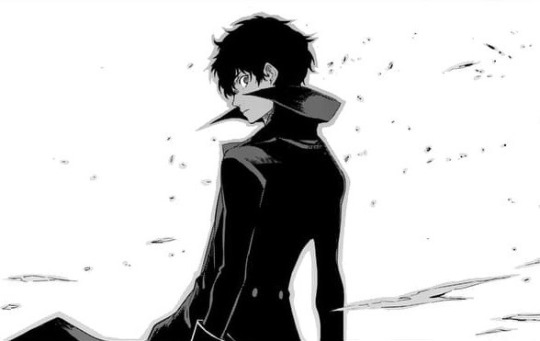
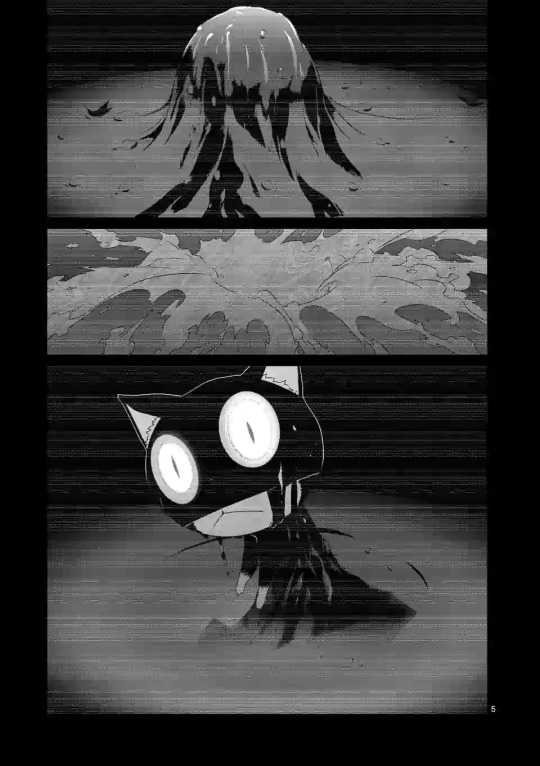
(look at Mona, coming into this world like the pustule that he is 8U)
Which isn't much, but it's something. At least Reg's AOA is better looking than the anime. 8U
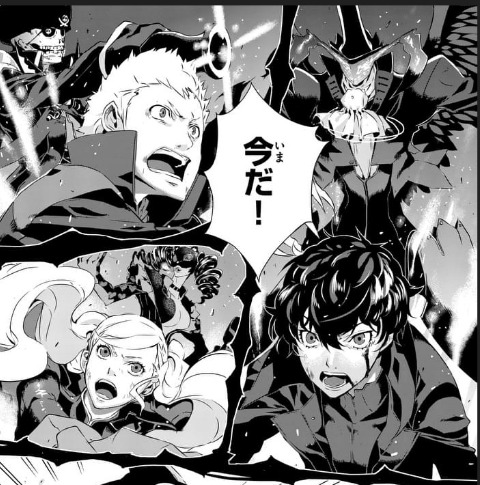
But I dunno, as the chapters go on, the Mangaka allows for more cuter expressions, and I just like their neat:
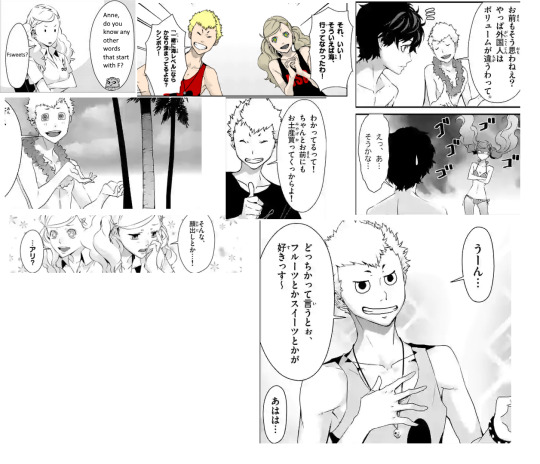
(btw I colored that page)
I dunno, it's not as overtly cutsey as Saito:
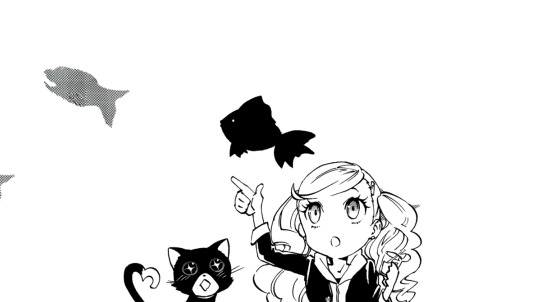
But they are still charming in a more simple way (without out having them go full chibi), it subtle but it gives it flavor. "Silly why are most, if not all those pics of Ryu and Anne?" I dunno guys maybe you should ask them how their backs are doing, cause they're the ones who are carrying the Reg manga when it comes to this! 8U
Tho I do think the first ch or two of Reg does a better job capturing P5's feel than the rest of the chapters, I think the mangaka is just.....bogged down by exposition and the game's BS that a lot of text on their pages so it almost reads like a novel:
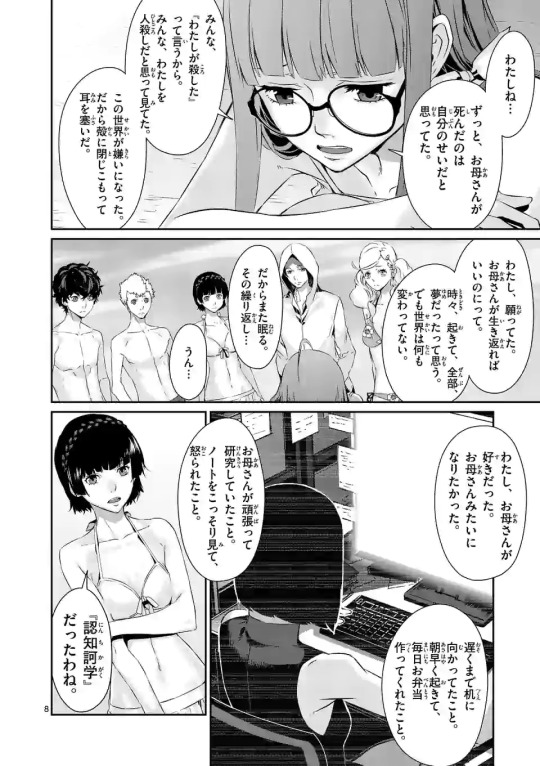
ALots of text, not the most dynamic of framing with the panels. It's kinda eh. I haven't really read the manga past the 2nd dungeon tbh (I mean......as the residential #1 Makoto hater, I think that's fair.....that I'd start to zone out during my least fav dungeon....and then continue zoning out during my 2nd least fav dungeon askfdjaflk)
But during the first two dungeon arcs, I liked how.....bad the PT were at thieving, I liked how green they were. It was obviously a learning process. I also like some of the fight choreo (Saito did the best hand to hand one in the series in P4U's Yu vs Sho....which I actually animated....spoiler.....no I have no released that...my dumbass wants to tempt fate and see if I can redo it in color even tho it took me 4 days non stop to get that animated in just black and white.....but I am a fool so alas 8U). I mean it's not mind blowing, but it was simple and decently thought out, which is more than I feel like we usually get (esp with the anime shows....or at least P4/5's).
But I think what draws me in is....it's lack of P5 style. P5 style has them being still oh so cool despite being new at everything. It's tired me out. P5's how identity is style. It's....style over substance (gonna rile some feathers with that....Cvit(?) vid title). But P5 is overtly stylish, to the point it......weighs on me. Drags me down. Tires me out. I don't think they're cool, I'm bored with it. Ironically, Reg manga lacks that, which......def would make someone (and me usually) give it much of a passing glance. It's very basic I guess. But.....consider me, being in P5 hell, surrounded by all it's nausea inducing stylishness, sees a small break in the hellish hurricane to see.......normalcy. It kinda makes me connect better with the kids (kinda, it's still P5).
They feel like normal kids, trying to do their thing (sometimes trying to look/act cool and failing), and.....it's just the absolute antitheses to P5's brand......and I think that's why I like it. KLFJDSAFLKJA;
Anyway, who knows, maybe when I catch up on Reg in english and re-read MM with the official translation I might change my mind about a few things, or at least how I rank them. But for post length sake, and my sanity sake, I think I should keep the anime and mangas out of the "Which entry do you hate least" post......because I should just make another post where I go into both mangas as well as compare and contrast the anime! :D I'm just delaying some insanity for later haha....
Wait.........I just remember Day Breakers exists......and I liked it....still do....don't have much issue with it. Well shit, that is probably the one entry I hate the least. fklsdjfalkjdfkla;jsL;FJljsfdlskafaj *sobs* nO NO, I committed, and that's just a sad loophole. fdklsajflakfj *sobs* I still need to the game thing, cause let's be honest, the games are where it counts.
So right now my ranking for manga/anime is:
Daybreakers>Reg manga> MM>>>>>>>>>>TV Show Anime and it's OVAs (may the burn in the hell fire from which they spawned)
Oh, one last thing, forgot to put it in but I dunno where to put it now. I like how the manga tones down the pervyness some:
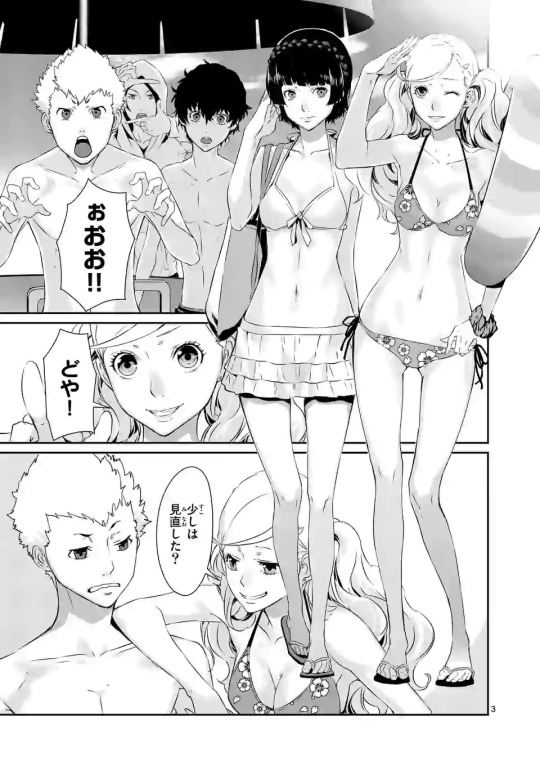
I mean Ryu is a fellow monkey. u_u .......but it's for the best I don't have to see his ape expression. ;w; (iirc the pyramid scene was a lot shorter/faster, but that's by the grace of reading and books rather than animation I suppose).
3 notes
·
View notes